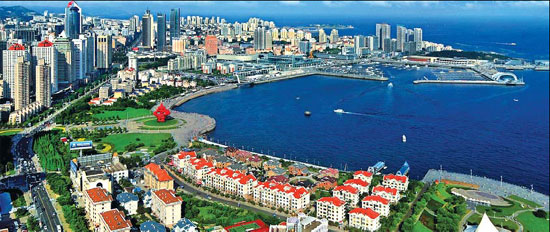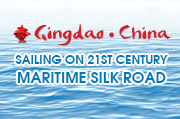Qingdao maps route to 'Blue Silicon Valley'
By Xie Chuanjiao ( China Daily )
Updated: 2012-11-08
|
|||||||||
|
Fushan Bay offers one of the most beautiful vistas of Qingdao. Photos provided to China Daily |
Plans wide-ranging economic harvest from ocean's bounty
Plans by the city government of Qingdao call for a "Blue Silicon Valley" in the economic center of Shandong province by 2020 offering a top environment for investment, entrepreneurial creativity and talented professionals.
"As a major coastal city at the center of Shandong peninsula's blue economic zone, Qingdao is poised to be the vanguard in developing the successful marine economy that the history has committed us to," said Li Qun, Party secretary of Qingdao.
The city boasts rich marine resources. It has 711 kilometers of coastline, some 50 bays and nearly 70 islands, as well as a total ocean area of 122,000 square kilometers.
Qingdao has nearly 30 marine research institutes and schools, one-third of the nation's total, which are also home to 19 top experts in the field of ocean studies from the Chinese Academy of Sciences and the Chinese Academy of Engineering.
The city has 20 oceanography labs and seven large oceanographic research ships.
Its marine-related economy grew to 66 billion yuan last year and hit 45.7 billion in the first half of 2012, up 20.6 percent year-on-year.
"The blue economy refers to all the production activities related to the exploration of ocean resources as well as service industries supporting ocean exploitation," said Li, who is also member of the standing committee of the Shandong Party Committee.
"The growth model of the marine economy also stresses sustained development and the harmonious relationship between human activities and nature," he added.
Innovation
Li said the city "will strive to accelerate development of the Blue Silicon Valley, establishing a full-service technological innovation system for a number of science parks, technology incubators and major research institutes such as the National Oceanography Laboratory and Deep Water Base".
Following the State Council's strategy to develop the marine economy, Qingdao announced its own plan in February - the Blue Silicon Valley, envisioned as a powerhouse of marine science and technology, and a magnet for high-level scientific talent, technology institutes and high-tech firms.
The plan calls for combining advantages in industry, public services and location, creating a new model of integrated technology-driven economic growth.
It is positioned to be a center of international marine science education, a demonstration for oceanic technology and a new seaside city.
The plan calls for it to enhance homegrown and integrated innovation in basic ocean scientific research, offshore and deep sea applied techniques, as well as their commercialization and application.
A 443-square-kilometer swathe of land to the north of Laoshan Mountain and its adjacent seas is planned as the core area of the eco-friendly Blue Silicon Valley.
Plans for the area include eight fields - new marine materials, deep sea operating instruments, ship equipment, marine life and biomedicines, new marine energy, energy conservation and environmental protection, marine farming, and comprehensive use of seawater.
Li said the city government will also set up more marine economy programs for the development of the West Coast New Economic Area, the Hongdao Economic Zone, Sino-German Eco-park and China-Japan-ROK Economic Cooperation Demonstration Area.
According to the government plan, the West Coast Economic New Area will cover 2,096 sq km of land and 5,000 sq km of sea, with an emphasis on harbor trading and international cooperation including a bonded zone, central business district and the Sino-German Eco-Park.
Hongdao in northwestern Qingdao is still in the planning stage, but its citizens are expecting a new urban district with eco-friendly environment, humanistic culture and technology-enabled development.
Li highlighted four keywords to characterize the effort - industry-driven, marine, high-end and emerging.
"We will strongly advance the construction of major projects and reengineer the industry to refine the value chain, making great efforts to cultivate an array of ocean industries and its supporting services, creating a new way of industrial transformation and upgrading our growth model," Li said.
"All the world's a stage and we will make our way to perform in the deep water and on the high seas."
xiechuanjiao@chinadaily.com.cn





